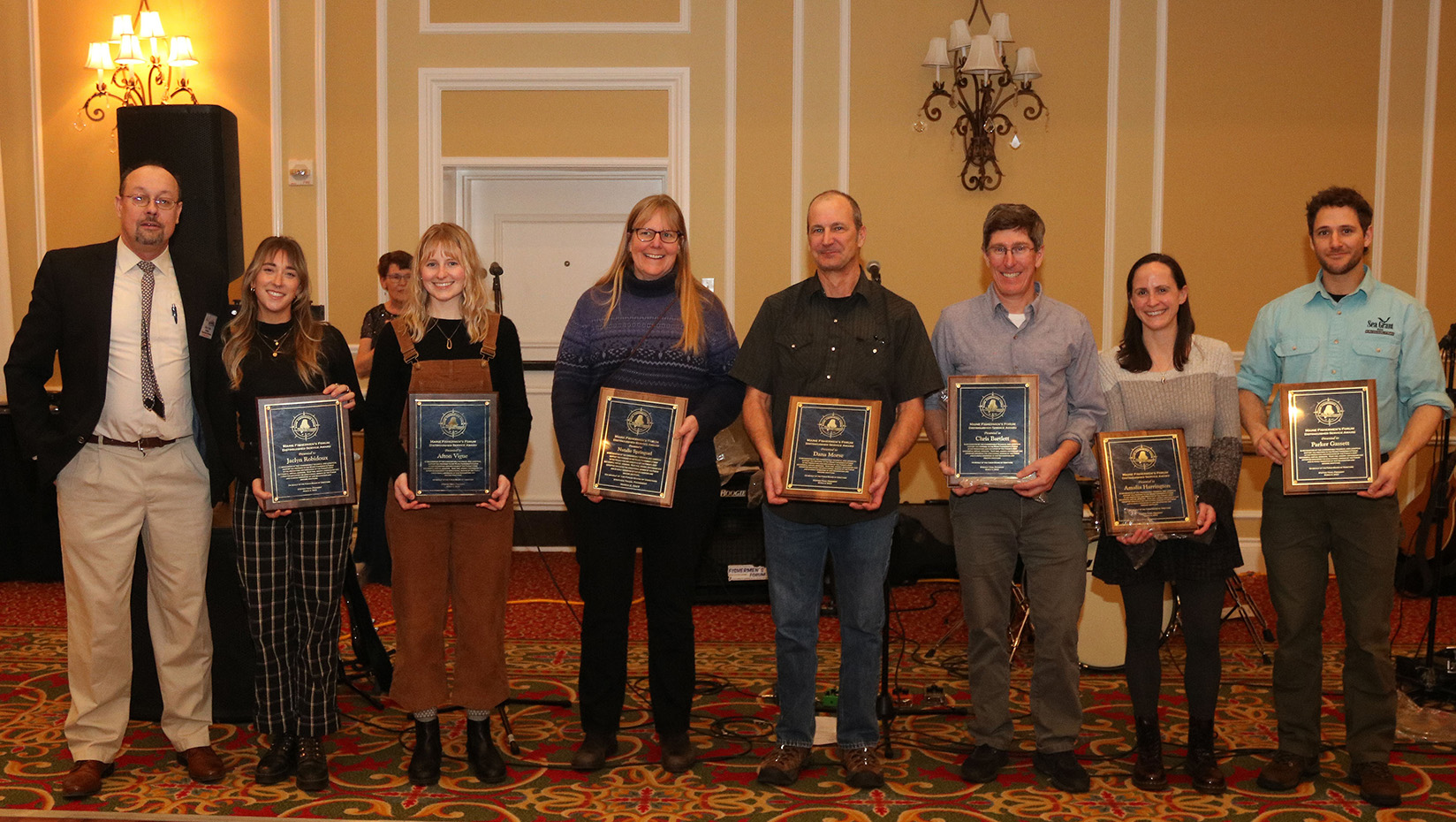
UMaine researchers and students share their science at the Maine Fishermen’s Forum
University of Maine students, researchers, Marine Extension Team members and alumni were among the more than 2,000 participants in the 48th Maine Fishermen’s Forum in Rockport, March 2–4. The annual three-day event brings together fishermen, gear suppliers, scientists, government officials and others to share information and collaborate on all things fishing: markets, resource status, regulations, the latest in technology, the environment and more.
UMaine’s Darling Marine Center, Aquaculture Research Institute, Lobster Institute, Maine Sea Grant, and School of Marine Sciences were among the more than 130 exhibitors at the forum.
“I had so many interesting and fun conversations with people at the forum,” said Lobster Institute assistant director, Chris Cash. “Prospective students, members of the industry and neighbors came by to chat — it is a great environment to share the University’s ongoing research and resources with the broader community and get feedback. A lot of collaborations are formed as a result of informal conversations that begin at the forum.”
UMaine faculty and students attended the event to learn more about Maine fisheries and fishing communities and to share their science. Graduate students Phoebe Jekielek and Kelsey Ward were among the speakers in a session, focused on Maine’s inshore scallop fishery and aquaculture. Fishermen, scientists and others engaged in Maine’s marine economy have been working together to understand and support the human and ecological dimensions of this fishery and possibilities for culture. The session, co-organized by Jekielek, a senior scientist with Hurricane Island Center for Science and Leadership, and Meggan Dwyer, associate director of UMaine’s Aquaculture Research Institute, was a chance to reflect on decades of work and to plan for the future.
Lobster Institute director Rick Wahle organized a session on how handling of lobsters can be altered to minimize loss as they are moved from traps, to boats, and then to trucks and airplanes through the supply chain. The session featured research findings by professor Damian Brady of the School of Marine Sciences and graduate student Cassie Leeman. A second session focused on lobster science was convened by Maine Department of Marine Resources scientists, mostly UMaine alumni, and included Amalia Harrington from Maine Sea Grant, who shared her work and the work of many researchers throughout the region funded through the Sea Grant American Lobster Initiative.
Maine Sea Grant has a long history of supporting the Maine Fishermen’s Forum, having funded the inaugural event in 1976 as part of a collaborative project. In 2021, when the forum Board decided not to host an in-person event due to the COVID-19 pandemic, Maine Sea Grant’s Marine Extension Team, in partnership with forum Board members and other partners, helped develop and host sessions online. They received the forum’s Distinguished Service award this year to commemorate those efforts.
“Our coastal waters are shared by individuals and communities with diverse interests. The Maine Fishermen’s Forum provides an annual setting for conversations around the issues those communities face,” said Maine Sea Grant director Gayle Zydlewski. “And for us, the forum is an opportunity to hear directly from the people we serve.” Zydlewski also serves on the Maine Fishermen’s Forum Board of Directors.
The 2024 Maine Fishermen’s Forum will be held Feb. 29–March 2 in Rockport, Maine. Registration opens Jan. 1, 2024. Learn more at mainefishermensforum.org.
Contact: Hannah Robbins, hannah.robbins@maine.edu, 207.581.1442; Christina Cash, christina.cash@maine.edu, 207.581.1443
